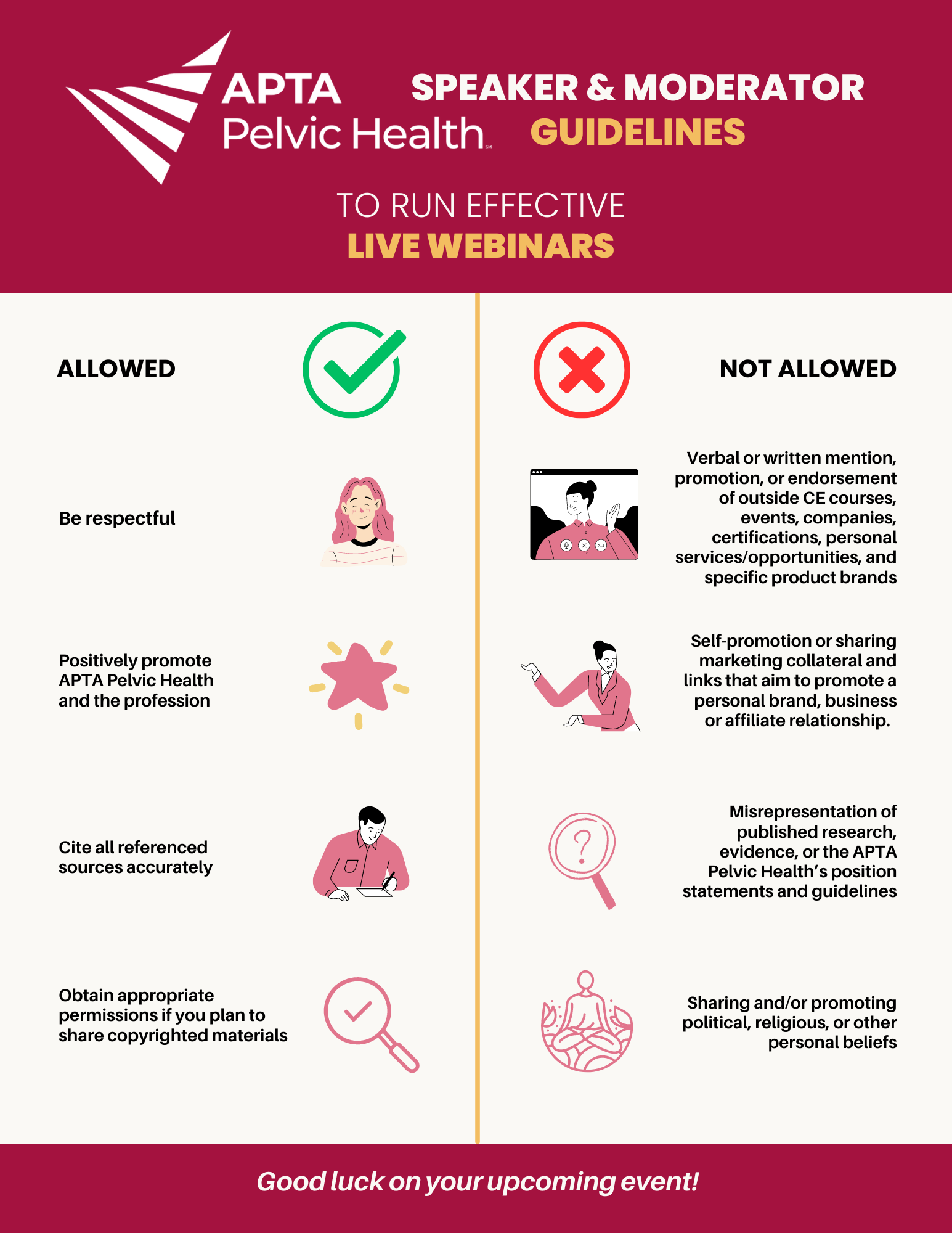Presenter Guidelines
Code of Conduct for Speakers and Moderators
APTA Pelvic Health webinar events promoted to APTA Pelvic Health members and the healthcare provider community using APTA Pelvic Health branding and marketing channels can often reach a wide audience and what is presented is often perceived as a reflection of APTA Pelvic Health’s organizational positions and stances. Although the APTA Pelvic Health lists disclaimers on each webinar webpage, what is gained by attendees during a webinar may unintentionally negatively impact their perception of APTA Pelvic Health, Hosts, and the physical therapy profession. It is important that when speakers and moderators present at APTA Pelvic Health webinar events and interact with the members of the audience, they exhibit the highest code of conduct and meet the following expectations.

Expectations
Speakers and moderators must:
- Be respectful and adhere to the APTA Pelvic Health Code of Conduct Policy and the APTA Code of Ethics Policy for the Physical Therapist
- Not promote or endorse outside courses, companies, organizations, or specific product brands that are outside of the Academy of Pelvic Health Physical Therapy (i.e. continuing education providers, equipment or product distributors)
- Provide written disclosure of all actual or perceived Conflicts of Interest during the webinar approval process and share the actual or perceived Conflicts of Interest at the start of the webinar event if the webinar is approved
- Avoid any self-promotion or share marketing collateral and links that aim to promote a personal business or affiliate relationships from which they personally benefit financially or non-financially
- Positively promote the APTA Pelvic Health organization, membership, events, and courses when relevant
- Not misrepresent published research, evidence, or the APTA Pelvic Health’s positions
- Not share and/or promote political, religious, or other personal beliefs
- Not promote treatments and services that aim to replace pelvic health physical therapy or the professional consultation of a primary care physician
- Avoid promoting consumer confusion. Examples include:
- Inappropriate use of “Pelvic health therapist" or “pelvic therapy” interchangeably with “pelvic health physical therapist” or “pelvic health physical therapy”
- Lumping pelvic health PT interchangeably with other professions, pelvic health physical therapy is distinct from other professions and must be presented as such
- Presenting treatments as a “cure” or “quick fix”
- Cite all referenced sources accurately, do not plagiarize, and obtain appropriate permissions if you plan to share copyrighted materials
Infractions
Webinar events are widely attended by APTA Pelvic Health members, non-members, and the healthcare community and are promoted using the APTA Pelvic Health brand trademarks, listservs, and resources to maximize reach and attendance. Although APTA Pelvic Health shares disclaimers, webinar attendees may unintentionally perceive speaker conduct and webinar content presented by speakers as the official organizational position of APTA Pelvic Health. It is imperative that all webinar speakers conduct themselves in a professional and respectful manner at all times. In the event the speaker breaches the above expectations or the live webinar content that is presented is found to deviate from the initially approved webinar content, the webinar may be removed from the live stream. The Board of Directors will address the infraction with the Host and may enforce disciplinary action which may include one or more of the following actions:
- Removal of the webinar recording and marketing collateral from all APTA Pelvic Health communication channels.
- Temporary or permanent suspension of the Host from hosting future webinar events.
- Temporary or permanent suspension of the Moderator/Speaker(s) from presenting at future webinars.
- Public rescind letter sent to all attendees to publicly retract the webinar distribution.
- If obvious plagiarism is evident, an official report may be filed and shared with the Speaker’s institution or employer.

